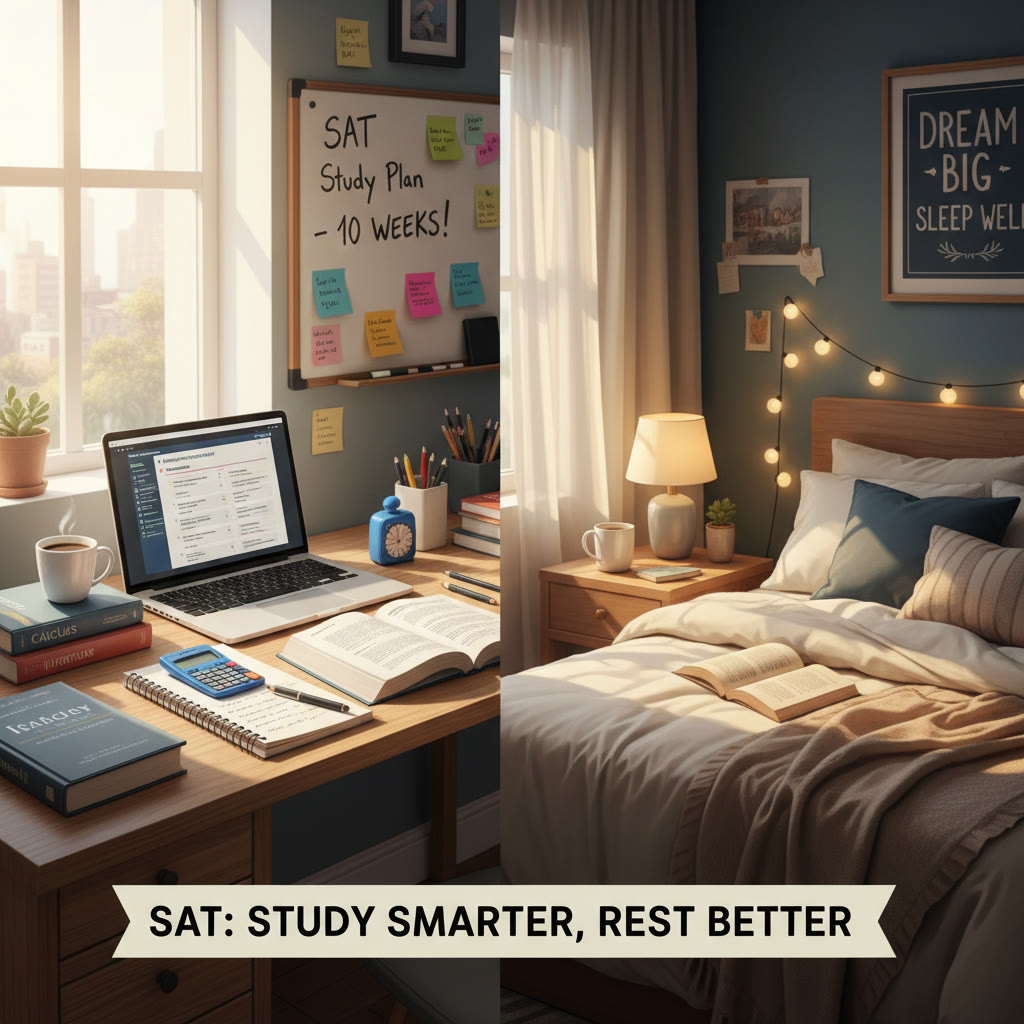How to Keep SAT Prep From Ruining Your Sleep Schedule
Studying for the SAT can feel like a marathon with no finish line: vocabulary lists, math problem sets, timed practice tests, college essays, and the constant pressure to improve. It’s tempting to trade sleep for another hour of review, but the truth is harsh and simple — sleep is one of your most powerful study tools. Skipping it might give you more hours awake, but it erodes memory consolidation, focus, and the stamina you need on test day.
Why sleep matters more than an extra review hour
Science shows that sleep does more than let your body rest. It helps the brain file away what you learned that day, strengthens recall, and primes attention. For the SAT, that means the vocabulary word you reviewed at 10 p.m. is far more likely to stick if you get good sleep afterward. Cramming into the small hours can give a short-term illusion of progress but weakens the very cognitive processes you want to protect.
Common sleep mistakes students make
- Late-night cramming the week before the test instead of reviewing in short, spaced intervals.
- Using stimulants and caffeine late in the day to force extra study hours.
- Irregular bedtimes that shift wildly between weekdays and weekends.
- Doing intense study sessions right up to lights-out, making it hard to wind down.
- Relying on passive rereading rather than active, efficient techniques.
Create a sleep-protecting study plan
Good SAT prep is a marathon strategy, not a sprint. That means planning study in a way that protects consistent sleep while maximizing learning. Here’s a step-by-step blueprint to do that.
1. Prioritize a consistent bedtime and wake time
Set a realistic bedtime and wake time and stick to it within a 45–60 minute window, even on weekends. Your brain loves predictability; a regular sleep schedule stabilizes circadian rhythms and improves alertness during study sessions. If your classes force early mornings, plan study blocks in the late afternoon or early evening instead of pushing bedtime later.
2. Use distributed practice (little and often)
Spacing study into shorter daily sessions beats long, late-night marathons. Instead of one 6-hour session on Sunday night, break that into four 90-minute sessions spread across the week. Distributed practice improves retention and reduces the need for last-minute cramming.
3. Schedule the hard stuff earlier
Do high-cognitive-load tasks — like timed practice sections, new math concepts, and reading passages — when you are freshest. Reserve evenings for lighter review: reviewing flashcards, summarizing errors, or doing untimed practice. This helps you keep evening wind-downs calm and sleep-friendly.
4. Reserve the last 60 minutes before bed for wind-down
Make the hour before bedtime a slow-down zone: avoid heavy problem-solving, bright screens, and anxious ticking off of checklists. Instead, read a non-SAT book, journal, practice breathing exercises, or do gentle stretching. The brain needs that buffer to switch from learning mode to rest mode.
Smart study techniques that save time and protect sleep
Not all study is equally effective. Knowing which strategies give you the most learning bang for your time will reduce study hours and spare sleep.
Active recall beats passive rereading
Practice retrieving facts and solutions from memory rather than rereading notes. Use flashcards, self-quizzing, or closing the book and summarizing a problem aloud. Active recall strengthens memory more efficiently than passive review, meaning fewer late-night hours are necessary to retain content.
Practice tests, but with purpose
Full-length practice tests are essential for pacing, stamina, and identifying weak spots — but they are also mentally draining. Space full tests 1–2 times per week at most, and treat the day after a full test as partially low-intensity: review errors in targeted 30–60 minute sessions rather than trying to fix everything in a marathon.
Quality over quantity for timed sections
When practicing timed sections, focus on deliberate mistakes analysis. One well-analyzed practice section where you categorize errors (concept confusion, careless mistake, time mismanagement) is more useful than two hurried, unfocused sections.
Practical daily routine: a sample week
This sample plan balances school, extracurriculars, and SAT prep while protecting 8–9 hours of sleep. Adapt the times to your schedule; the key is consistency and leaving wind-down time at night.
| Day | Wake | After-school study | Evening | Bedtime |
|---|---|---|---|---|
| Monday–Friday | 7:00 AM | 4:00–5:30 PM: focused math or reading practice | 6:30–7:30 PM: review flashcards/light drills; 9:30–10:30 PM: wind-down | 11:00 PM |
| Saturday | 8:00 AM | 10:00 AM–12:30 PM: full-length practice test (alternate weeks) | 2:00–4:00 PM: error analysis; evening free | 11:30 PM |
| Sunday | 8:00 AM | 3:00–5:00 PM: targeted review | Evening: light activities, prepare for school week | 11:00 PM |
Note: For weekends with a full test, shift the day so you have at least 8 hours of sleep before test day and plan low-stress review the night before.
Example: Night-before the test plan
- Evening: Quick 30–45 minute, low-stakes review of formulas or one error log. No new topics.
- Wind-down: 60 minutes off screens, light snack if needed, set out clothes and ID.
- Sleep: Aim for your usual bedtime. Use breathing or progressive relaxation if anxious.
- Morning: Balanced breakfast, arrive early, avoid last-minute cramming.
Nap strategy: when naps help — and when they hurt
Naps can be restorative when used right. A 20–30 minute power nap can boost alertness without making it hard to sleep at night. Longer naps (over 60 minutes) risk grogginess and disrupting nighttime sleep.
- Power nap: 20–30 minutes in the mid-afternoon is ideal for a study day.
- Avoid naps after 4:00 PM if you want to keep your bedtime regular.
- If you feel exhausted from a practice test, a 60–90 minute recovery nap early in the afternoon can help, but follow it with a calming evening routine.
Caffeine, sugar, and study stamina
Caffeine is a useful tool when used strategically. It can improve focus for a tough study session, but the timing matters. If you drink coffee or energy drinks late in the day, they can linger and delay sleep onset. For most adolescents and young adults, it’s wise to avoid caffeine after mid-afternoon (about 4 pm), and limit total daily caffeine to moderate amounts.
Tips for using caffeine wisely
- Use caffeine to boost a morning or mid-afternoon session, not to power through the night.
- Hydrate: dehydration worsens fatigue and concentration, so balance caffeine with water.
- On test day, stick to what you normally do — don’t experiment with new drinks or doses.
Deal with anxiety without sacrificing sleep
Test anxiety drives late-night review and rumination. Addressing anxiety directly will help both sleep and performance.
Simple anxiety-busters
- Pre-sleep journaling: list 3 wins from the day and 1 thing to review tomorrow — then close the notebook.
- Breathing exercises: 4-4-8 or box breathing for five minutes can lower worry before bed.
- Mindfulness or body scan apps (used before the one-hour screen cutoff) help shift focus away from anxious loops.
Remember: learning relaxation skills is like practicing any other technique for the SAT — it takes deliberate repetition. If anxiety is a major issue, consider talking with a counselor or using structured tutoring sessions that build confidence step-by-step.
Environment matters: make sleeping and studying distinct
Create clear boundaries between your study environment and your sleep environment. Your brain learns context. If your bed is where you review notes, it will associate that space with alertness and problem-solving rather than rest.
- Study space: bright, organized, and separate if possible from where you sleep.
- Sleep space: cool, dark, and reserved for rest and light relaxation reads.
- Blue light: limit screens before bed or use low-blue light settings; consider physical glasses if needed.

Use practice testing to inform sleep-aware planning
Practice tests do two things: they show where you need work, and they reveal how your stamina holds up. If you notice that mental sharpness drops after the third section, you can plan study blocks that mimic that fatigue curve and practice recovery strategies, rather than staying up late to relearn content.
How to analyze a practice test without late-night overwork
- Score each section and identify error categories — spend your next session only on those categories.
- Create a small, targeted plan: three 25-45 minute sessions across the next three days dedicated to those weak spots.
- Use Sparkl’s personalized tutoring and benefits if you want extra help: 1-on-1 guidance can help you pinpoint exactly which errors to prioritize so you don’t waste nights on low-impact review. Their tailored study plans, expert tutors, and AI-driven insights can accelerate recovery from weak areas while protecting your sleep.
When to pivot: signs your plan isn’t working
Be honest with yourself. If your schedule is consistently pushing bedtime later, your alertness is declining during school, or your practice scores fall despite extra hours, your plan needs fixing. More study isn’t always better; smarter, targeted study combined with reliable sleep almost always wins.
Troubleshooting checklist
- Are you trying to learn large new topics within 24 hours of a test? Spread them out.
- Do you feel wired after studying at night? Move heavy sessions earlier.
- Are practice tests followed by all-night review? Instead, schedule two short review sessions in the next two days.
Real-world student examples
Here are two quick case studies that show how small changes made a big difference.
Case A: Maya — the perfectionist night owl
Maya stayed up late every night pushing through problem sets, convinced extra hours meant more improvement. Her practice test scores were inconsistent and she felt foggy in morning classes. We shifted Maya to distributed practice: 90 minutes per weekday after school focused on one content area, plus one weekend practice test. She added a 60-minute wind-down and avoided screens before bed. Within three weeks she reported clearer focus, better retention, and an extra hour of sleep most nights. Her scores stabilized and errors became more predictable and fixable.
Case B: Jamal — the exhausted multitasker
Jamal balanced an internship and SAT prep, squeezing study into late hours. He introduced power naps (20 minutes) after school and moved high-focus study to early evening before dinner. His total nightly sleep increased by 45 minutes, and his problem-solving speed improved because he tackled tasks when most alert. Targeted tutoring sessions helped him streamline topics he needed to learn most, saving hours.
Last-minute tips for test week
- Keep your routine normal: alarm, breakfast, and sleep schedule should mimic practice-test days.
- Avoid last-minute cram sessions the night before. One quick review is fine; all-night study is not.
- Use a calming pre-sleep ritual: warm shower, light reading, journal a few wins.
- If you use Sparkl’s personalized tutoring, ask your tutor to create a concise test-week checklist that preserves sleep — tutors often know which last-minute tweaks give the most value.
Final thought: sleep is study time
It’s easy to think that more awake hours automatically mean more learning. In reality, sleep is part of the learning process. Protecting it is not laziness — it’s smart strategy. Aim for consistent routines, use efficient learning techniques, and schedule study blocks that match your peak focus times. When stress rises, use quick relaxation tools and reach out for help if you need it. Expert tutors, clear plans, and tools like Sparkl’s personalized tutoring and benefits (1-on-1 guidance, tailored study plans, expert tutors, and AI-driven insights) can make your study time exponentially more effective so you never have to sacrifice sleep for scores.
Remember: your brain does the heavy lifting for memory and focus while you sleep. Treat your sleep like a study session you can’t skip — because in many ways, it is one of the most important sessions of all.














No Comments
Leave a comment Cancel